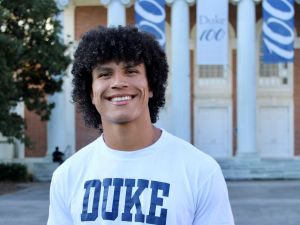Maya Ghanem Knows Collaboration is Critical

Maya Ghanem is a graduating senior majoring in International Comparative Studies and minoring in Religious Studies, with a concentration in the Middle East. A leader of the queer Muslim student group, Jummah 4 All, Ghanem’s research is grounded in queer Muslim studies and sexual ethics among Muslim authorities.
Their honors thesis on queer Muslims and environmental futurisms focused on the interconnected struggles of queer Muslims and nonhuman creation against Orientalist binaries. Ghanem’s writing on analyzing Arab media and queer-affirming approaches to sexual ethics has been published in Mellon Mays Undergraduate Fellowship Journal.
During their time at Duke, Ghanem has also worked as a programming coordinator at Duke Arts and served as the Justice Director of the Undergraduate Environmental Union, a hub for environmental programming, action and collaboration at Duke.
We reached out to Ghanem to ask for their reflections on their years as a Duke undergraduate student. This interview has been lightly edited for length and clarity.
What piece of advice would you give to your 17-year-old self?
I would tell my 17-year-old self to be open to change, and that things will likely not be what you expected. It’s okay to go with the flow and allow life to take its course. Sometimes, the change you were not expecting can lead to wonderful experiences and opportunities!
Did collaboration play a role in your success at Duke?
Collaboration was critical to creating and sustaining Jummah 4 All at Duke. Jummah 4 All is a queer Muslim group on campus, which started by organizing mixed-gender and queer affirming Muslim prayers. When we began to organize these prayers, we greatly benefitted from student collaboration and participation for all parts of our prayer services. Rather than having one religious authority lead all parts of the service, it felt much more fulfilling when multiple students collaborated to lead different parts of the service. As Jummah 4 All expanded, we worked together to protect our group while organizing events centered around queer Muslims.
When was a time that you’ve felt supported as a Duke student?
I felt very supported in my ICS Senior Seminar class while I wrote my honors thesis on Queer Muslim Environmental Futurisms. Throughout the year, my brain was struggling to map all the ideas I had in my head. Being in a class with such wonderful peers and advisors helped me organize my thoughts and produce something reflective of my research and experiences. Our cohort of students became close — and I am grateful to witness everyone’s honors thesis and their research processes.
Does anyone from your undergraduate years stand out by the positive impact they made on your academic life?
My research advisor, Erika Weinthal. I reached out to Professor Weinthal in 2020 after I heard about her work on the Energy-Health Nexus in the Middle East. This was in the middle of the pandemic, and Professor Weinthal was so gracious and made the effort to make sure I felt supported and connected. I started off as a research assistant for the Energy-Health Nexus project, but as I shifted to queer Muslim studies, I was so grateful for Professor Weinthal’s continued support. She helped me not only with my academic pursuits, but also with financial, emotional and life experiences as I navigated Duke.
What is something that you love about Durham?
I love how Durham came together in the past few months to take action in Palestine. I am proud to be a part of a community that successfully pushed for a ceasefire resolution in Durham! I have met so many wonderful people outside of Duke who have been critical to sustained Palestinian resistance in Durham, which includes making deliberate spaces for queer and trans Palestinians.



